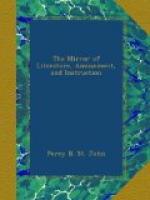It received the name of Colombia College in 1787; when by an act of the legislature, it was placed under the care of twenty-four gentlemen, styled, “the trustees of the Colombian College,” who possessed the same powers as those of King’s College.
In 1813, the College of Physicians and the Medical School were united; and the academical and medical departments are together styled “The University of New York.” It is now well endowed and liberally patronized by the legislature of the state. The College consists of two handsome stone edifices, but the view given is but one-third of the originally intended structure, and contains a chapel, hall, library of 5,000 volumes, museum, anatomical theatre, and school for experimental philosophy.
The Medical College is a large, brick building, containing an anatomical museum, chemical laboratory, mineralogical cabinet, museum of natural history, and a botanical garden, and nine medical professors. Every student pays to each professor from 15 to 25 dollars per course.
There are also professors of mathematics, natural philosophy, history, ancient and modern languages, logic, &c. The number of students in 1818 was 233, but it has now greatly increased. As many in each year as finish their course of study, walk in procession with the other students and all the professors, preceded by a band of music to St. Paul’s church, where they deliver orations in English and Latin before a crowded assembly. This is called “a commencement.”
The situation is about 150 yards from the Hudson, of which, and the surrounding country it commands an extensive view. The whole is enclosed by a stone wall, with an area of several acres, interspersed with gravel walks, green plats, and full-grown trees.
Beta.
Note.—All
our readers may not be aware that the remains
of Two Literary Colleges
still exist in London: Gresham
College and Sion College—or
we should say of one of them.
The first was founded and
endowed by that excellent citizen
Sir Thomas Gresham. He
was much opposed by the university of
Cambridge, which endeavoured
to prevent the establishment of
a rival institution. (This
was two centuries and a half ago.)
He devised by will, his house
in Bishopsgate street, to be
converted into habitations
and lecture-rooms for seven
professors or lecturers on
seven liberal sciences, who were
to receive a salary out of
the revenues of the Royal
Exchange. Gresham College
was subsequently converted into the
modern general excise-office;
but the places are still
continued, with a double salary
for the loss of apartments,
and the lectures are delivered
gratuitously twice a day in a
small room in the Royal Exchange,
during term-time. The will
of the founder has not, however,
been actually carried into




